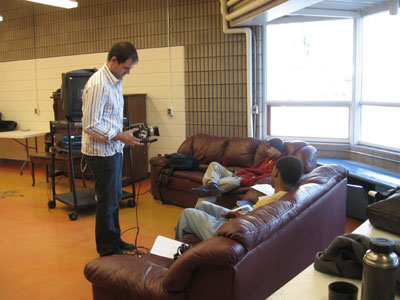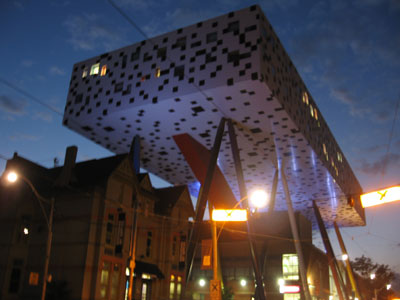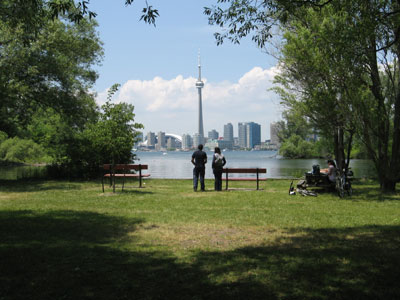Terry connected with the Outer Limits program through his link with Scadding Court and he has been providing ESL training as well as goal setting and life planning to the participants since the first week of December. He will also accompany the group to India where he will offer counseling services and be responsible for administrative issues and trouble-shooting for the entire three months.
More than 30 years ago Terry himself travelled to India, and just in January and February of 2006 he had a chance to go back to this fascinating country and went backpacking with his wife. He flew into Bombay (Mumbai) and travelled all the way up to the Himalayas. During these trips he gathered a number of impressions of Indian people: he experienced them as very warm, friendly and generous and felt that they were genuinely interested in getting to know you on a more profound level. Terry added that the distance is broken a lot quicker in India and there is a lot of joy, noise and celebration. He was humbled by the complexity of Indian culture, and the ingenuity, energy and industry of the poor people.
Terry explained that the four Toronto participants will initially be teaching in teams of two, and later split up and be given their own groups. They will be teaching English as a Second Language to a total of about 50 children who range in age from 4 to 14. Terry really believes in this innovative approach and says that many other intervention programs fail. This program reaches young people at transitional points in their life, reaches in deep and allows for profound personal growth.
He also explained to me a variety of items on a display table that the group will be taking to India with them: first and foremost anti-malarial pills, ESL teaching aids and games for the children as well as sports equipment for football, soccer, basketball and baseball which will give the Toronto participants a chance to play sports with the Indian children. Big emphasis will be placed on inter-cultural connections. Terry added that he can tell the young men are ready to go and he is very excited to be part of this opportunity.
Yusdel Amaro Hidalgo, a 24-year old Cuban born man, is also one of the participants in the Outer Limits program. I initially approached him in Spanish, my favourite language, and told him that I spent 16 days in Cuba in April of 2005. Cuba has been one of my most interesting travel experiences to date and I fondly recall my time in Havana and the things I learned about this unique culture.
Yusdel talked about his childhood and adolescence in Havana and spoke of a very strong sense of community. He had a great social network and close friends and enjoyed many good times growing up. About six years ago he arrived in Toronto, by then in his late teens, to be reunited with his father, a Cuban filmmaker, who had relocated to Toronto several years earlier. He was now together with his father and sister in Toronto while his mother has stayed in Cuba. Being reunited with his dad was great for Yusdel since he had not seen much of his father for about six years.

Yusdel Amaro Hidalgo
At the beginning he spoke very little English and spent a lot of time working on his language skills in ESL programs. His early years in Toronto were difficult because he missed this sense of community. Although there is a fairly large number of Cubans in Toronto they live fairly dispersed throughout the city, and the sense of community that you see in the streets of Havana simply does not exist here in North America. Despite his linguistic challenges, Yusdel finished high school in three years, sometimes studying with students that were four or five years younger than him.
One of most significant experiences of culture shock for him were that here in Toronto it was not socially acceptable to compliment good-looking women as it would be totally normal in Havana. He learned that inappropriate comments or gestures could be interpreted as sexual harassment and could lead to severe consequences. I agreed with him that these cultural differences exist, and looked at it from the other perspective: when a woman travels to Cuba it certainly takes some time to get used to the come-ons, the comments, the catcalls and the whistles. For many North American women this behaviour may come across either as flattering, annoying or even threatening while for a Cuban woman it would be absolutely normal. There is no doubt that these cultural differences exist and that it takes a while to get used to new ways of doing things.
Since completing high school Yusdel has been working in various jobs. Due to his father’s training he spent some time in the film industry as a sound technician. He has also worked in the hospitality industry, in construction and in various community programs. More recently he has been working with Toronto’s Park and Recreation Department.
For Yusdel it will not be the first time in India: he already went there in 2003 for an international benefit concert. Scadding Court had organized this concert several years ago and as Yusdel is currently at a crossroads in his life, they invited him to participate in the Outer Limits program. In 2003 Yusdel spent 21 days in India and when he was approached to participate in the Outer Limits program he immediately thought he’d like to go back to India again.
During the training program he has learned a lot about such diverse topics as racism, social class, community work, relationship skills, film making and photography, and he has gained a whole new perspective of life. He admits that it is finally starting to sink in, that he will be going to India in just a few days. He is looking forward to going and can’t wait to go. He wants to learn as much as he can about the people and the culture and hopes that doors will open and that he will be able to apply the lessons he is going to learn there to his life in the future.
Tessefa Francis, a 27 year old Torontonian will also be going to India. His parents came to Toronto from Kingston, Jamaica, and Tess, as he is known by all his friends, grew up in different parts across Toronto. Some of the neighbourhoods and the public housing projects he grew up in were quite rough and he witnessed a lot of violence. Nevertheless, he says he had a normal childhood, adding that in the winter he and his friends played outside until their feet were cold. Tess admits that during high school he was more into the fun than the academics, school was definitely secondary, and he scraped by as far as his grades were concerned.
After high school he started a program in business administration at Seneca College, but realized that it wasn’t his thing and dropped out after the first year. He then took a program in video editing at the Academy of Design because he wanted to do something creative. For several months he worked on a special project for the National Film Board – a documentary with a title along the lines of “The Making of a Hip-Hop Dancer” where he had an opportunity to shadow the video editor. One thing he learned was that you can never have enough footage.

Tessefa Francis
So far this has been Tess’ only exposure to the film industry. He said that he tried to apply for various opportunities in the industry, but ponders that he may not have put in enough effort. He has also been working with the City of Toronto Parks and Recreation Department during the summer, doing outside gardening work in the parks. He adds that he doesn’t mind working outside, and during the winters he has been looking for work.
Tess connected with the Outer Limits program when a friend called him out of the blue, saying that the program needed a person with a post-production background. The preparation for this program in India has opened his mind about issues such as culture shock, oppression, economics and politics.
Reflecting on the situation of visible minorities in Canada, Tess said that in middle school he had friends from every nation, but during high school teenagers started to socialize more within their own racial and ethnic groups. He commented that he has faced some of the stereotypes commonly targeted at black males, for example women will clutch their purses in his presence, and shopkeepers step up their surveillance. There is no doubt that you stand out as a visible minority, but at the same time he shrugs and says you just have to deal with it and not let it discourage you.
As far as his stay in India is concerned, Tess hopes to come back with a sense of accomplishment, a new perspective on life, and hungrier. He admits that there are many less fortunate, less privileged people out there and concludes there is a lot of opportunity, you just have to grab it. Tess has never really travelled much before, so he admits he is a little nervous, yet excited about this new venture ahead of him.
Levis Adjetey was born in Ghana 26 years ago and came to Toronto at the age of eight. About his time in Ghana he remembers a sense of warmth and community growing up and he found that when people have less they become a lot more creative. It was snowing when Levis first set foot on Canadian soil, and he remembers being unimaginably cold.
The first few years were difficult for Levis who did not speak English when he first came here. During his early years he had a strong accent and was bullied by one his classmates. Today he is very articulate and his English is completely accent-free.

Levis Adjetey
Levis liked high school, he played a variety of sports including basketball and was on different sports teams and also got involved in arts. After graduating he went to Humber College and took a one-year program called “Design Foundations” which prepares students for academic studies in a variety of design-related careers. He left the program after one year and went to an animation school for about a year and half, but did not finish that program. Instead he took the first year of a program in drywall finishing, but ran out of funds and had to start working.
He works with the Toronto Community Housing Corporation supervising children in an arts and crafts program. Although he enjoys working there this job does not pay a lot and is not a long-term career option. His manager knew Kevin Lee and mentioned the India project to Levis. His first reaction was shock, he was caught off guard, but upon reflecting on this opportunity he decided to go.
Levis has found the first few weeks of training very educational and has learned a lot about India and its caste system, even the food. He is looking forward to communicating with the Indian children and learning about their lives. At this stage he said he just wants to get there. His feelings are a bit mixed and he is not sure what to expect. As far as social problems are concerned, he concludes that there are similar issues everywhere.
He hopes that he can give a child something that will stay with them and expects to come back with lots of pictures and stories and a love for India. Levis figures it’s going to be a life-changing experience.
Last but not least I had a chance to talk with David Trattles, the photographer who has been teaching the participants essential photo skills in order for them to be able to document their experiences in India. David is a real character, a unique, off-beat individual with a great sense of humour who spends much of his year outside of Canada.
On a recent trip to India he purchased a bike locally for $20 and rode it across the country to Calcutta (Kolkata) where he started to do a photo documentary on a group of Muslim women boxers who got into boxing in order to create more diverse work opportunities for Muslim women. David specializes in stories on marginalized people and creates multi-media shows of his experiences. He has done work for CIDA, Canada’s International Development Agency and worked with AIDS victims in Zambia. Other projects took him to Central and South America. In total David has visited more than 80 countries across the world.

David Trattles
David also does a lot of work with schools and his photo presentations introduce the public to the world as he sees it. He has done photo essays for Canadian Geographic and the CBC who ran a half-hour television program about his assignment in Newfoundland. Elle Magazine recently ran a story about David and the Muslim women boxers that he is working with.
When in Canada, David lives a very simple life. He considers himself the luckiest guy in the world when he is riding through India on a bicycle, free from luxuries and materialism, and free to discover and connect with locals who he characterizes as some of the warmest people on this planet. He commented that in a place like India “you feel your eyes are too small”.
In addition, David runs an adventure photo tour company called www.photomediterraneo.com that provides guided tours to Sicily, Spain, Malta and Tunisia. Special highlights of these tours include the Tomatina – Spain’s famous tomato throwing festival, the magic of Sicily including the cheese rolling event, the wood-top-spinning event, local processions and dinners with local hosts, and discoveries of Malta as well as camel riding in the Tunisian Sahara. The emphasis of David’s photo adventure tours is on attracting fun-loving people and getting them involved in some unique local activities to enjoy great food, friendly locals, unusual special events and spectacular scenery. The more I read about David’s programs the more I thought that one day I’ve gotta go on one of these tours myself…
As far as the Outer Limits project is concerned, David did not want to teach the participants too much and restrict their creative expression. He wanted their photography experience to be self-directed so they can present reality as they see it and encourage them to look at the world with open eyes. He feels strongly that this program will encourage them to broaden their mind and help them reflect on their options in life. David says that getting exposed to India really deconstructs one’s privilege and teaches how important a sense of community and family is in so many places around the world, something that is often lacking in our Western developed nations.

Shawn, Yusdel and Tess, enjoying some music
After my interview with David I returned into the classroom where I was watching Yusdel on the piano, teaching some of his musical knowledge to his co-students. He even tried to teach me some chords for playing salsa. David entertained the crowd with his jokes and he is quite a talented comedian, producing his knock-knock jokes alternatingly with a (rather authentic) Irish, Indian or German accent. The atmosphere was upbeat and optimistic, and for me this had been a day of great fun.
As I observed the young men, I saw so much potential and so much hope, and this day at Scadding Court Community Centre inspired me to seriously consider traveling to India myself to visit the Outer Limits program first hand and see this Toronto-Kolkata collaboration in action. As the year progresses, I will have an opportunity to work closely with the team from Scadding Court on a big fundraising event to raise money for this innovative program that is promising to change lives on both sides of the planet.

The crew from the Outer Limits program
Amazing things can happen when a group of committed people get together and put their minds together to foster and develop human potential on both sides of the globe.




